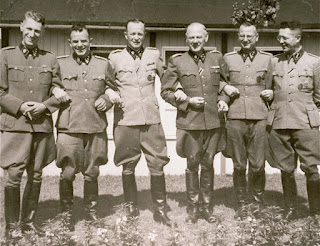On this day 2nd August 1943.
On this day 2nd August 1943.
200 Jews revolted in Treblinka concentration camp in Poland, burning down several buildings, and attempted to escape; camp guards found and killed most of them.
The conspiracy among the Treblinka prisoners started in the spring of 1943.
Marceli Galewski was its leader. Despite receiving authority over the prisoners from the Germans, he gained trust of his fellow prisoners.
Prisoners with military experience played an important role in the secret organisation. Among them were Polish Army captain and a doctor - Julian Chorążycki and Czechoslovak Army lieutenant - Želomir Bloch.
The conspirators successfully managed to copy a key to the German weapon arsenal which allowed them to enter it and steal rifles and grenades when they were ready.
However, most of the prisoners were armed with axes, crowbars, knives and Molotov cocktails.
The preparations did not always go smoothly. The date of the uprising was moved many times due to unforeseen events and accidents. This is how doctor Chorążycki died.
The Germans found valuables and money hidden in his living quarters, which the escapees would use to survive.
A very strong impulse, which increased the determination of the conspirators and lifted their spirits, were the news about the Warsaw ghetto uprising, which they heard from the Jews deported from Warsaw.
The uprising started on the 2 August, at around 4 pm. During that hot day, a part of the camp staff went by the Bug river to swim in it.
It is unknown how many Germans and Ukrainian guards were killed by the prisoners during the uprising. Probably not many. However, the plan to burn the camp down was successful.
Only the brick building with gas chambers was left standing. Around 300 prisoners lived to be free.
The remaining number out of 850 prisoners perished under the gunfire of the guards. However, most of the escapees were killed during pursuit or after it.
Around 90 people survived the war. Among them were Jankiel Wiernik from Warsaw, the author of a detailed report about how Treblinka II functioned (Rok w Treblince; eng:
A year in Treblinka), Samuel Willenberg, who described his experience in his work Bunt w Treblince (eng: Riot in Treblinka), and Czech Jew, Richard Glazar, the author of the Stacja Treblinka (eng: Station Treblinka) account.
After the uprising of the prisoners,the Treblinka II extermination camp was liquidated. The last transport of Jews from Białystok was murdered there on August 19, 1943.
Later, all buildings were destroyed, the area was ploughed and transformed into a farm, where a former Ukrainian camp guard lived. In almost one year, the Germans murdered over 800 thousand Jews in Treblinka.
Most of them were from the districts of Warsaw, Radom and Białystok. Among them were almost 300 thousand prisoners of the Warsaw ghetto.
The uprising in Treblinka was not an isolated incident. Similar uprising efforts were made in other extermination camps - in Sobibór on October 14, 1943 and in Auschwitz-Birkenau on 7 October, 1944.













Comments
Post a Comment